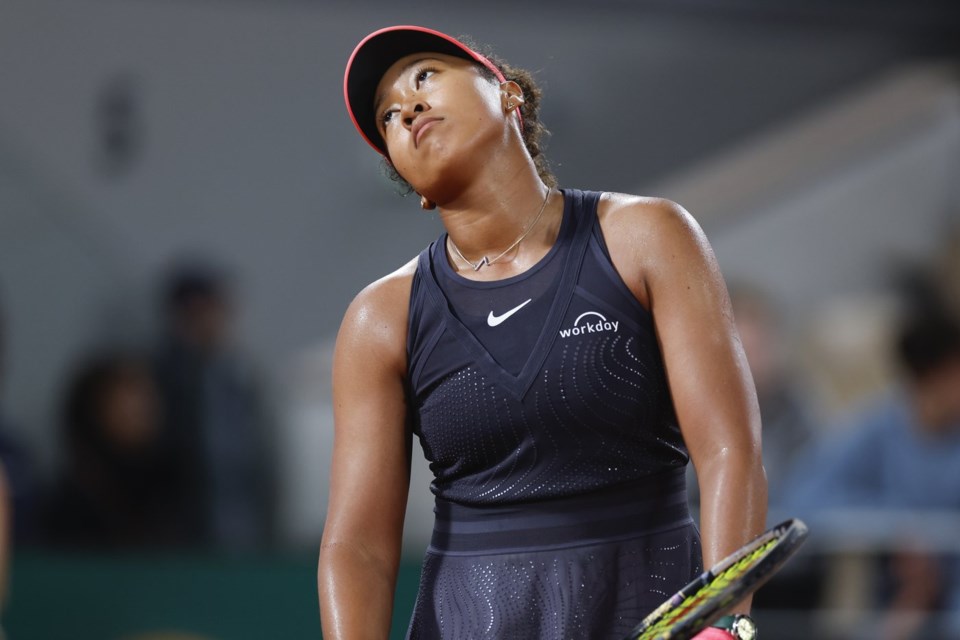PARIS (AP) ŌĆö saved a match point and grabbed the last five games to sneak past 7-6 (1), 1-6, 7-5 in the second round of on Wednesday night in a contest between the current No. 1 and a former No. 1 who both own four Grand Slam titles.
For Swiatek, this extended her Roland Garros winning streak to 16 matches as she pursues a third consecutive trophy at the clay-court major tournament. For Osaka, who let a 5-2 lead in the concluding set slip away, this amounted to an announcement that she is still capable of elite tennis.
They went back-and-forth for nearly three hours as rain loudly pelted the outside of the closed roof at Court Philippe Chatrier ŌĆö showers forced the postponements of 23 singles matches until Thursday ŌĆö and a riveted, if hardly full, crowd alternated their support between the two players. Sometimes, spectators called out before a point was done, prompting admonishment from chair umpire Aur├®lie Tourte.
Osaka served for the victory at 5-3 in the final set, and was a point away from winning there, but she put a backhand into the net. Soon, when Osaka missed another backhand, this one long, Swiatek finally converted a break point on her 10th chance of that set, and they played on.
Maybe the lack of high-level matches caught up to Osaka, because she continued to fade, her mistakes mounting, including a double-fault to hand over another break that put Swiatek in control 6-5. Swiatek, who has led the WTA rankings for most of the past two years, then held serve one last time to emerge with a difficult victory.
Still, this was, without a doubt, OsakaŌĆÖs best performance since she returned to the tour in January after 15 months away while becoming a mother. (Her daughter, who is 10 months old now, accompanied Osaka to Paris and recently started walking.)
Indeed, itŌĆÖs been a few years since Osaka played this capably and confidently, hammering big serves at up to 122 mph (197 kph) and imposing groundstrokes. Her quick-strike capabilities were on full display: Osaka won 82 of the 139 points (59%) that lasted four strokes or fewer, and she finished with a 54-37 advantage in total winners.
All of those familiar mannerisms were back, too. She would turn her back to Swiatek to reset between points, hopping in place, giving a little tug to the brim of her pink visor and slapping her left palm on her left thigh a couple of times.
Osaka celebrated the most important of points by shaking a clenched fist and shouting ŌĆ£Come on!ŌĆØ
After narrowly ceding a stirring opening set, Osaka grabbed nine of 10 games in one span to dominate the second set and jump out to a 3-0 edge in the third. Then it was 4-1. Then 5-2.
As one ball or another would fly past Swiatek, zipped near a corner or right at a line, she would turn up toward her guest box in the stands and shoot a look of confusion or concern in the direction of her coach and her sports psychologist.
SheŌĆÖs not used to this sort of one-way traffic coming head-on in her direction. Normally, itŌĆÖs Swiatek who is delivering lopsided sets at a foeŌĆÖs expense, especially on clay. She now has won her last 14 matches this month, with titles on the surface at Madrid and Rome ŌĆö a clay double no woman had done since Serena Williams in 2013.
But this marked a sudden return to the Osaka everyone came to expect, match in and match out, back when she was at the height of her powers, climbing atop the rankings and gathering two trophies apiece at the U.S. Open and Australian Open from late 2018 to early 2021.
It was in May 2021 that Osaka withdrew from the French Open before her second-round match, explaining that she experiences before speaking to the media and revealing she had dealt with depression. She took time away from the tour for a mental health break, then after her title defense at the U.S. Open a few months later ended with a third-round loss.
She helped usher in a change in the way athletes, sports fans and society at large understood the importance of mental health ŌĆö and prompted those in charge of various sports, including tennis, to take the issue seriously and .
Osaka never has managed to be at her best on clay courts, but she sure seemed comfortable this evening.
She entered the day with an 0-4 record on the red stuff against opponents ranked in the top 10 and hasn't ever been past the third round at Roland Garros. This also would have been her first win anywhere against a top-10 opponent since January 2020.
Instead, though, it is Swiatek who moves on, able to continue her bid to become the first woman with three championships in a row at the French Open since Justine Henin in 2007-09.
___
AP tennis:
Howard Fendrich, The Associated Press



